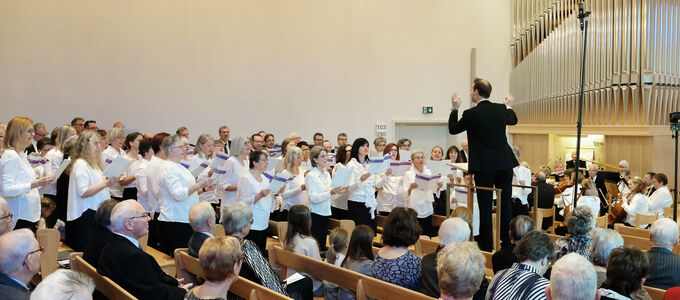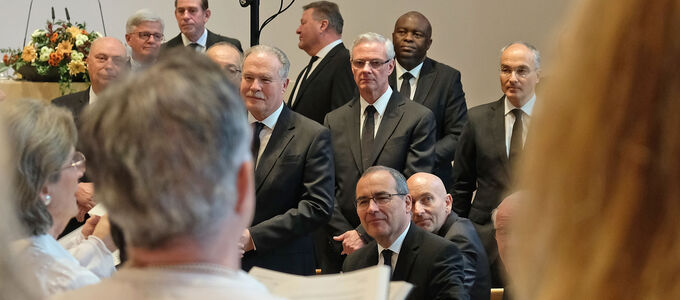
The old Adam: an old acquaintance from past sermons. But is this more than just an empty phrase? Who remembers what exactly this is all about? A fresh boost from a divine service with the Chief Apostle, including instructions.
At the conclusion of the District Apostle Meeting, Chief Apostle Jean-Luc Schneider visited the congregation in Winterthur with all the District Apostles and their assistants on 20 November 2022. This service was based on Romans 6: 4: “Therefore we were buried with Him through baptism into death, that just as Christ was raised from the dead by the glory of the Father, even so we also should walk in newness of life.”
The Chief Apostle began by addressing the song of the choir, which formulated a question by God: “Whom shall I send? Who will carry My light?” “Does the almighty God need us now?” asked the Chief Apostle, providing the answer directly: “Certainly not. This call is not for Him because He needs help. This call is for us. The Lord wants to give us the opportunity to test ourselves to see if we are of the same mind as our Lord and Master.”
The right attitude is a prerequisite for being able to enter into His kingdom. And for this we need to grow into the image of Jesus Christ and put off the old Adam. The Chief Apostle explained what is quite typical for the old Adam:
- a lack of faith and trust
- refusal to obey and a desire to be independent from God
- a lack of remorse and refusal to acknowledge one’s faults
- anger and envy
- a lack of compassion and indifference
He explained in detail how the old Adam can be discarded.
Strength of faith instead of distrust
Adam and Eve had been created in the image of God, but had not been able to muster enough trust. That had been the first step to the Fall.
Baptism with water and the Spirit is the basis for believers to become a new creature and to become more like the new Adam, Jesus Christ. Remaining strong in faith and trusting in God is no walk in the park, Chief Apostle Schneider explained. It is a battle that will have to be fought until the end. Here too Jesus serves as our model: “On the cross, Jesus Christ also did not understand why His Father did not respond. He was stunned, but trusted Him.”
Obedience instead of complete independence from God
“Adam and Eve wanted to decide for themselves. They wanted to be God themselves and decide what is good and what is bad. In other words, they were not going to let anyone tell them what to do.” This is how the Chief Apostle summed up their attitude and asked: “Do we still allow God to tell us what to do?”
The Chief Apostle said that it is not enough to be New Apostolic, to attend divine services, to offer, and to pray. There must be development: “What about your personal development? Are you still working on that? Are you still fighting for your faith? Are you still making progress? Or have you come to a standstill?”
Remorse instead of pointing a finger
When God came to the first human beings after the Fall, Adam and Eve reacted by passing the blame instead of feeling remorse: “It’s Eve’s fault!” said Adam. “It’s the snake’s fault!” apologised Eve. Cain also reacted with reproach when his sacrifice was not accepted, whereas the Lord had respected Abel and his offering. Cain blamed Abel and killed him in line with the motto: “Why should he get anything if I get nothing.”
This is deeply ingrained in the human being, the Chief Apostle said. It is much easier to accuse and blame others than to admit to our own mistakes. The new Adam, on the other hand, is completely self-critical, repentant, and discerning. He comes to God conscious of his need for grace.
Love instead of envy
“There are many situations in our lives, in society, or in this world where we are confronted with injustice.” The list of injustices is long: poverty and wealth, sickness and health, fellowship and loneliness. There is no explanation why one has more and the other less, said Chief Apostle Schneider.
“The first reaction is that one resents others for what they have.” The consequence of this envy is the apportioning of blame. Like Cain, many people today tear themselves up in envy and lose themselves in their anger toward God.
“Let’s respond like the new Adam, like Jesus Christ,” the Chief Apostle invited the congregation. “He had done nothing wrong and was sentenced to death like the greatest of criminals. He trusted God and He loved the people to the end.”
Compassion instead of indifference
Typical of the old Adam is unkindness and indifference, said Chief Apostle Schneider and referred to Cain and Abel once more: “Am I my brother’s keeper? After all, there is a strong temptation for people to say: yes, well, for many people things are not going well, but what can I do about it? It is not my fault. And besides, there is nothing I can do about it anyway.”
The Chief Apostle said that people settle comfortably into this self-centredness and become complacent.
The new man in Christ cannot change the world either, “but we can continue to show love and have compassion. We can ease many a pain by loving others and helping them where we can”.
The real solution is that God wants to free all human beings from evil, the Chief Apostle said: “If I spread the gospel, if I use my strength so that the kingdom of God can be completed, I can contribute to alleviating people’s suffering.”






















